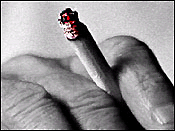NACS: Menthol Ban to Spark Black Market
 WASHINGTON, D.C. – While the fate of menthol cigarettes and tobacco products is yet to be determined by The U.S. Food and Drug Administration's Tobacco Products Scientific Advisory Committee, NACS -- the Association for Convenience and Petroleum Retailing along with Canadian Convenience Stores Association held a press conference detailing what they called the unintended consequences that would arise from a ban on menthol tobacco products.
WASHINGTON, D.C. – While the fate of menthol cigarettes and tobacco products is yet to be determined by The U.S. Food and Drug Administration's Tobacco Products Scientific Advisory Committee, NACS -- the Association for Convenience and Petroleum Retailing along with Canadian Convenience Stores Association held a press conference detailing what they called the unintended consequences that would arise from a ban on menthol tobacco products.
Speaking at the conference was Lyle Beckwith, senior vice president of government relations for NACS, who said a potential ban on menthol cigarettes and tobacco products causes "a great deal of concern at retail, should there be some level of constraint on availability of menthol," but also causes concern over what such a ban would do to the contraband market. Beckwith alluded to the situation in Canada, where through several excise tax increases, display bans and other regulations, nearly 50 percent of cigarettes smoked in the country are contraband.
Providing background on the Canadian environment was Dave Bryans, president of the Canadian Convenience Stores Association. He noted that there has been "unprecedented growth of contraband [cigarettes]" in Canada, due to "punishing" tax increases over the past four years, along with the enactment of a display ban and a flavor ban on cigars. These actions caused smokers to turn to different avenues to obtain their product of choice, not quit smoking, Bryans said.
Contraband activity is highest in Quebec and Ontario provinces, due in part to their proximity to New York state, which has a large population of Native American tobacco businesses, he said, noting four years ago, when Bryans met with the Canadian government to discuss the black market issue, contraband product made up 13 percent of the cigarettes smoked in those provinces. The next year, black market cigarettes reached 23 percent, and then 33 percent the third year. Now, 48 percent of cigarettes smoked in those provinces -- or nearly one out of every two -- are contraband.
These illegal products are coming from across U.S. borders and tribal sources, Bryans said, coming in what he called "baggies" that sell for between $8 and $10. The contraband cigarettes are putting his association's members out of business, according to Bryans.
"We've lost 10 percent of our stores over the last two years," he said, noting it is not only the loss of the tobacco sales, but also the impulse and ancillary products such as milk, bread and beverages, which go along with the cigarette sales.
"Canada is now the leader in contraband [cigarette] sales throughout the world," concluded Bryans. "The government has ignored it because of the [tribal] issue, and every time there was a ban on something, it would fuel more people to move to contraband." He added the Canadian government decided not to ban menthol, because the contraband market would be fueled even more. "I'm not sure if we can reign [the contraband issue] in and return it to some normalcy."
Beckwith related Bryans' situation in Canada to a potential result of a ban on menthol in the U.S.
"We face the banning of a currently legal product, which would create an immediate contraband market for menthol with all the problems [Bryans] described," he said. "Menthol has 30 percent of the cigarette market and [if there was a ban] 30 percent of [cigarette] consumers would turn to other venues to find the products they want. It is that environment that we are concerned about."
